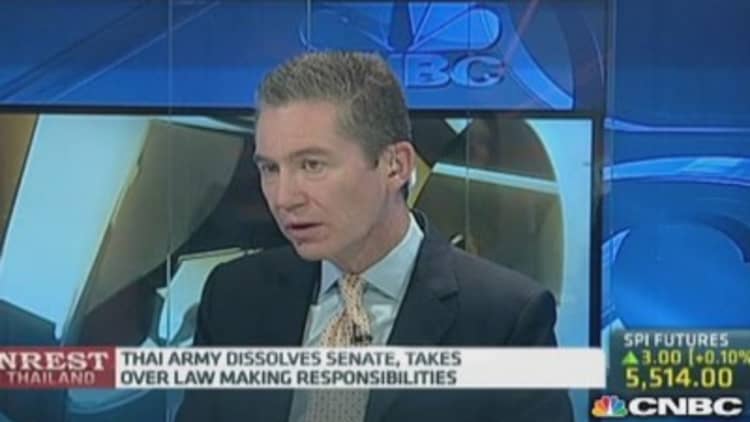
Bargain hunters sharpening their knives in hopes Thailand's military coup will bring buying opportunities should put the silverware away, Goldman Sachs said in a note.
"Although political unrest has occurred on a number of occasions in the past, this looks to be the first time in the past decade when politics is having a material negative impact on the profit outlook," Goldman said in a note Sunday.
"Valuations are no longer attractive, and after the recent multiple expansion, the market may become more vulnerable to earnings pressure," it said, keeping an Underweight call on the market.
Read More Why Thailand's latest coup is different this time
After more than six months of political protests and two days of martial law, Thailand's army chief General Prayuth Chan-ocha declared the military had seized power in a coup late Thursday. The country has faced 19 military coups, 12 successful, since it became a constitutional monarchy in 1932.
While Thailand's stock market has generally posted solid recoveries after previous coups, this time consensus earnings have been cut by around 10 percent over the past two months, compared with generally resilient projections during past unrest, Goldman noted.
"To contextualize, the Global Financial Crisis is the only period in the past decade where Thailand has had a larger magnitude of earnings cuts than now," it said. "The current EPS (earnings per share) downgrade cycle is likely to extend further."
Goldman cut its 2014 and 2015 earnings growth forecasts to 5 percent and 9 percent respectively, well below consensus expectations for 10-12 percent over the period, citing its projection the economy will contract by 0.5 percent this year and grow just 3.8 percent next year.
Read More Thailand's crisis: What you need to know
It doesn't expect a meaningful earnings recovery until 2016.
"Arguments that one should buy Thai equities during the current political tension because this has worked in the past lack fundamental support," it said.
In past periods of political turmoil, Thailand's shares tended to trough at around seven to eight time forward earnings, but shares are currently trading around 12 times earnings, Goldman noted.
"These contradict claims that the market has discounted adverse political news," it said.
Read More Coup may bring relief to corporate Thailand
In addition, while the market may find some support from foreign investors' light positioning there after a sharp selloff over the past year, "we do not think light positioning alone can catalyze a sustainable rally," Goldman said.
From 2013 to mid-March, foreigners sold nearly $7 billion of Thai equities, more than the cumulative buying over 2009-2013, it noted. But foreign positioning may not be particularly light. Since the foreign selling since 2013 was at higher prices than the purchases, the outflows may only represent around two-thirds of previous inflows, not the full amount, Goldman said.

While Thailand's SET index is up nearly 14 percent this year, Goldman believes recent fund flows are from investors pouring money into global emerging market funds, while funds with dedicated mandates for Thailand are still seeing outflows.
Others are also cautious on the market.
Read More Thailand's growth outlook goes under the knife
"People are actually quite well weighted in Thailand. It's an Overweight for most investors," Garry Evans, global head of equity strategy at HSBC, told CNBC. "I would still be wary of Thailand."
Despite the frequency of Thailand's political unrest, "the problem is a bit deeper this time," Evans said.
"Fundamentally, the problem there is every time we have an election, (deposed former Prime Minister) Thaksin Shinawatra or his proxies get elected," he noted. "The establishment in Bangkok doesn't like that. That fundamental split there is not being sorted out yet."
In addition, this time, "the longer-term story is that the king is not in good health," after having been the bedrock of Thai society for around 70 years, Evans noted. "Clearly, it adds to the uncertainty."
Nomura also doesn't expect the usual post-coup market bounce, noting shares are trading at 12 times earnings, above the long-term average, compared with nine times earnings at the time of the 2006 coup.
Read More Fugitive Thai minister says army led government into trap
"The country entered this political crisis with a weak economy," Nomura said in a note Friday. "It will emerge from the crisis with an even weaker domestic economy."
In the short term, however, Nomura expects the military junta will soon provide a roadmap for returning to democracy, which should help calm stock market anxiety.
While it doesn't expect another bull market in Thailand any time soon, "we see light at the end of the tunnel for this political crisis, which should lead to a gradual recovery in the stock market," Nomura said.
—By CNBC.Com's Leslie Shaffer; Follow her on Twitter @LeslieShaffer1

